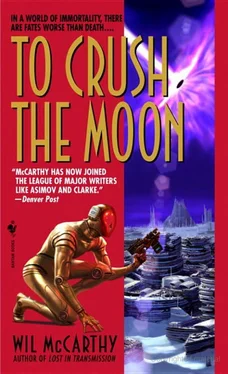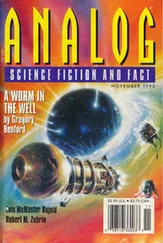To Crush the Moon
by Will McCarthy
To Michael Barnstijn and Louise MacCallum
for their tireless patronage of
the arts and sciences
With special thanks to Anne Groell for buying into my madness, to Deanna Hoak for taming it, to Hayden Green Mountain for the view that inspired this multivolume story, to Rich Powers and Gary Snyder for serving as vital sounding boards and bullshit detectors, to Bruce Hall for editing as though he were autistic (I mean this in a good way), and to Cathy for, well, everything.
The third part of this volume is drawn in part from twenty-year-old doodlings in the margins of the Computational Fluid Dynamics notebook I used at CU Boulder in 1985. Ah, Boulder. The title and a bit of the Lune imagery come from a dream I had during the same period, in which I held and examined a paperback book by that name, apparently written by myself. I’d like to thank Chun-Yen Chow and Scotty Cassut for inspiring these, and Richmond T. Meyer for the offhand remarks and critiques that have been cooking in my back brain ever since. More recently I had the pleasure of discussing the physics and biology of the squozen moon with Jack Williamson, and with Hal Clement (Harry Stubbs) shortly before his death. I’m grateful to both for their enthusiasm and support.
That these silly ideas have actually wormed their way between the covers of a book is literally a dream come true, so in addition I’d like to thank you, the reader, for indulging me in this way. You rock.
The ideas behind parts one and two have also been a long time building, and owe their cohesion in large part to Gary Snyder, Shawna McCarthy, Mike McCarthy, Vernor Vinge, Scott Edelman, Shelly Shapiro, Chris Schluep, Anne Groell, Stanley Schmidt, Bernard Haisch, Richard Turton, and Sir Arthur C. Clarke. I am their imperfect messenger; hold them blameless (well, mostly blameless) for any errors you encounter in these pages.
Chapter Zero
in which a city’s gates are breached
The skirmish at Timoch’s gate is little recorded by conventional history—a minor engagement of Silver and Yellow and Stealth Gray, lost in the shuffle of much larger events. But a great deal of subsequent chaos turns on it, as an avalanche is said to turn on a single pebble. Regard it, then, as a moment of critical change which makes all the rest of it possible. It begins like this:
In the two hundred and first decade of the death of the Queendom of Sol, an ancient man finds himself trudging across the plains of a strange world. His escort—half a dozen armed men nearly as ancient as he—have already led him from the base of a bluff called Aden very nearly to the walls of a city called Timoch. And although the man has been to this world before—has lived here, wept here, bled and sweated here—he’s never seen either of these places. Indeed, he’s not even sure they existed when last his bootheels trod this gray, powdery soil, for he has spent a great many years… away. Asleep. Ensorcelled.
The world’s name is Lune, although it was once called Luna. The man’s name is Bruno de Towaji; he was once called “King.” See him now in your mind’s eye: a body incapable of frailty, wrapped round an ancient soul. His frayed, yellow-white hair extends to his shoulders in a kind of fan shape—very thin on top. His teeth are chalky nubs in a jaw as sturdy as ever. His skin—liver-spotted and yet still flushed with youth—is not so much wrinkled as creased . As if he’s been folded up in a drawer somewhere.
Which is not far from the truth. Not nearly as far as Bruno would like.
“In decades past, the oldest towers were still enlivened. Programmable—faced with wellstone,” says Bruno’s primary companion, Conrad Mursk, pointing at the city with young-old fingers as the group crests a hill and looks down upon it. “They had diamond cores and deep foundations. Survivors of the Shattering, yes, very old and very grand. But twenty years ago there were some strange malfunctions, and Imbrians can be painfully superstitious about things like that. So, in the Year of the Lamb the buildings were torn down at great cost. The high towers which remain are of poured concrete over an iron lattice—a technique dating back to the Old Moderns of pre-Queendom Earth.”
And that seems a strange thing to say, for Mursk is no architect. Hasn’t been for a long, long time. Instead, he has passed himself down through the ages as a kind of soldier. Indeed, the guards accompanying the two—five men-at-arms as frizzed and ancient as Mursk and Bruno themselves—call him “General Radmer” when they call him anything at all.
“Let’s not tarry here, shall we?” says one of them.
The men are angry, for this old leader of theirs—whom they clearly adore—has dragged them through one battle already, and is urging them now to Timoch, where they were once—and perhaps still are—considered criminals.
“Too much metal down there,” says Sidney Lyman, the nominal leader of this ancient band. His tone is disapproving as he glowers down at the city. “How can the glints resist? There aren’t soldiers enough—nor walls, nor glue—to hold them at bay forever.”
Ah, and that’s the other problem: this war of theirs. Not of these men—these Olders—in particular, but a war belonging to the entire world of Lune. And it’s going badly, and as near as Bruno can determine, this places the entire human race at risk.
He glances up at the Murdered Earth, visible as a puckered distortion in the evening sky. The sun has set behind the mountains here, but the sky is still bright, alive with clouds of fierce orange and yellow. And behind them, the tortured rainbow of sunlight refracting around the centimeter-wide fleck of hypercondensed matter that was once the world—the one and only world—of human beings. It is, in truth, a tragically beautiful sight.
There is a Murdered Venus as well, and a Murdered Mars—crushed into black holes virtually indistinguishable from Earth’s—and Bruno has no reason to suspect the other planets, especially the gas giants, have been spared in the years of his exile. That leaves only the moons and asteroids and planettes, many of which had still been thriving in the Iridium Days—the last days Bruno can still remember. But given the tendency of economic depressions to isolate vacuum habitats, slowly choking off the energies and machineries of their air supply, it’s doubtful any could have survived this long. That leaves only the planettes, which of course have problems of their own, and cannot retain atmosphere indefinitely without maintenance. Surely a great many of them have failed already.
And that leaves only Lune, that greatest of planettes, that living world squozen from the lifeless mass of Earth’s primordial moon. Squozen by Conrad Mursk, in fact, at the command of Bruno de Towaji.
“Well, it’s really no problem of ours,” adds Sidney Lyman. He points an elbow in Bruno’s direction, forcefully enough that Bruno half expects a Palace Guard to materialize from the ether to restrain him. But the Guards are dust now, like the Queendom of Sol itself, and Lyman goes on. “We’ll get this Ako’i fellow back inside yonder walls, then scurry like hell to reach the veils of Echo Valley in time for sunset.”
Which isn’t saying much, Bruno muses, considering that sunset—judging from the angle of the sun and the shadows of the trees—is still a good thirty-five hours away. The days are long here.
“He’s not going ‘back’ to Timoch,” says Conrad Mursk. General Radmer, Bruno reminds himself. Not Mursk. They call him General Emeritus Radmer. And I am Ako’i. “He’s going to it.”
Читать дальше












